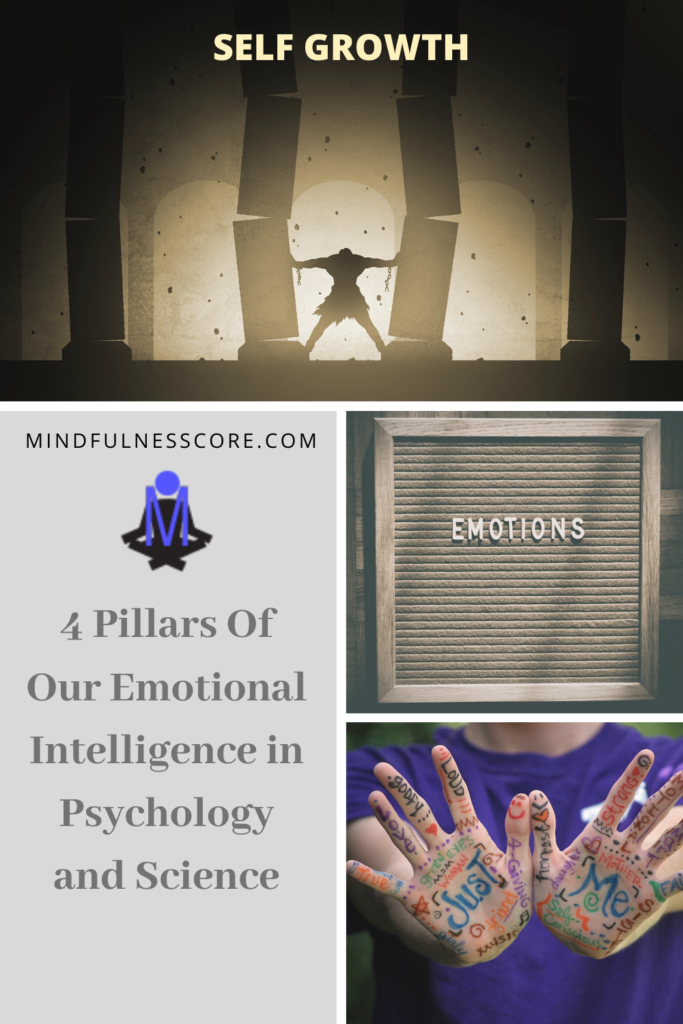4 Pillars Of Our Emotional Intelligence in Psychology and Science
What would be the first thing that will pop into your mind if someone said the word “Intelligence”? It is highly likely that you will immediately start to think of math, logic, or even science. This is because we have been tuned to focus sharply on the analytical component of intelligence. You would have hardly called someone “intelligent” in your life who were not good at things like math and logic. Ever since the years of pre-school, we have been taught that the primary criteria of defining intelligence are via a person’s analytical skills. However, as per psychology, there is another side to intelligence; a side that is just as important or perhaps even more important on certain occasions. This component of intelligence is called “Emotional Intelligence”.
The concept of “Emotional Quotient” represents that logic is not the only perspective with which different problems can be seen. More often than, emotions are considered as the opposite of thinking. In reality, however, emotions can only be defined as an alternate perspective. The world-renowned scientist, Charles Darwin, stated in his “Theory of Evolution” that the origin of emotions can be traced to the evolution of the human brain. For instance, with evolution, our brain developed a novel experience of a negative emotion called “fear”. It was because of this emotion that our forefathers were able to recognize the environment that was threatening for their survival.
This signifies that emotions are a valuable tool for the process of decision making in our day to day lives. It gives us an alternate perspective of the things which broadens our view and enables us to make an informed decision. Therefore, it is just as important to focus on improving your emotional quotient (EQ) as it is to strengthen your intelligence quotient (IQ) if you are looking forward to leading a balanced life. However, you can’t work on your emotional intelligence unless you are familiar with what does it entail. Taking this into consideration, we have highlighted the four conspicuous pillars of emotional intelligence to enhance your understanding of the EQ.
1.
Being Aware Of Your Emotions
The first component of your emotional intelligence is the awareness about your own emotions. Remember that almost all of your emotions have two primary ingredients. The psychological component of your emotion is confined to your attitude, the thoughts which run through your mind when you are experiencing the emotion or your beliefs. The physical component, on the other hand, is the sensation that runs through your body as you experience the emotion. For example, if you are excited, you could have thought of an imminent joyous event in your mind that translates into a bodily sensation of a ticklish feeling in your stomach.
More often than not, putting a label to the emotion that you are experiencing is more than sufficient for its effective management. Reflecting on your emotions and observing the associated thoughts and sensations is a fine practice for a better understanding of your emotions. It enables you to see essentially how does your brain function? The familiarity with what you are feeling, the thoughts in your mind, and the physical sensations that are accompanied by them is the component of your emotional intelligence. For the purpose of improving your EQ, therefore, you need to master the art of understanding your emotions.
2.
Managing Your Emotions
The second pillar of your emotional intelligence is the skill to effectively manage and respond to your emotions. You can think of it as a multiple-choice question. You have been told that none of the answers are wrong, but you are required to choose the most suitable answer. How do you determine the one response that is the most suitable, you ask? This selection is primarily dependent on the situation. For instance, if you are giving a presentation to your potential clients and they are failing to understand your point, it is likely that you would be confronted with the emotion of frustration, annoyance, or even anger. But responding to this emotion by yelling at your clients can only be construed as inappropriate for the situation.
There are multiple strategies that can be used for [restrict] effective management of the emotions. You could channel the associated energy into a different activity, for example, exercising. If you have suffered a negative experience, you can try and compensate for it with a positive experience like listening to your favorite music. Similarly, you can choose to avoid what is known to be a trigger for you. For instance, if you know that certain people kindle the fire of negative emotions in you, you can choose to avoid seeing them. Another very effective strategy to manage your emotions is to focus on the emotion itself while preventing an impulsive action derived from it. An advanced version of it could be to respond to the emotion by acting in exactly the opposite fashion, compared to what the emotion was pumping you to do. It is also recommended to try meditation and mindfulness practices to effectively manage your emotions. Such practices reduce the high levels of stress, bring peace to the mind, restore the mood, and prevent acting impulsively on your emotions.
In simpler words, the more emotionally intelligent you are, the better you would be in responding to them appropriately with regard to the situation.
3.
Practice Empathy
Now that you have learned to understand your own emotions and manage them effectively, it is time for you to move on to the third component of your emotional intelligence which is commonly referred to as Empathy. Empathy can be defined as the ability of a person to virtually walk in someone else’s shoes. It enables you to have a glimpse of the other person’s perspective of the situation. With empathy, you try to learn their thoughts, their emotions, and what they could be feeling in response to any given experience. It is the understanding that your perspective, thoughts, emotions, and feelings could be markedly different from theirs.
Empathy is a skill that is as close to mind-reading as it ever gets. With empathy, you can analyze the external actions of a person to get an understanding of his internal thoughts and emotions. A person with higher emotional intelligence is better at understanding others that present him as more supportive and reliant. It helps a great deal in building meaningful social relations. Remember, it is not possible to completely read the mind of the other person, but with empathy, you can make an effort into getting a sense of their thought process.
All in all, your emotional intelligence is not confined to yourself only. Only by understanding your own emotions as well as having the ability to see others’ perspectives can you truly make yourself emotionally intelligent.
4.
Responding To Their Emotions
The fourth and last ingredient of your emotional intelligence is the ability to choose the most appropriate response to their emotions. Just as the second component was to effectively manage your own emotions, the fourth ingredient is to manage other people’s emotions in an effective fashion. This is what broadly determines your social skills.
Remember that a number of our emotions are based on our social connections. Be it love, embarrassment, rejection, hate, etc., it is rare for these emotions to have an existence outside our social connections. Therefore, having the ability to appropriately respond to the emotions of the people around you is important to build meaningful social relationships. For example, if one of your colleagues is going through a hard time, giving him verbal support and trying to boost his morale is more likely to turn it into a good friendship.
As before, there are various ways to respond to someone’s emotions. An emotionally intelligent person is capable of recognizing the most appropriate response depending on the situation. Such an individual understands the emotional contagion; how emotions can transfer from one person to another. Like when you go to a party and see everyone being happy, excited, and having a good time, it automatically signals your own brain to be happy and excited as well. Therefore, such people are more likely to have a positive, energetic vibe in general, so that they can spread optimism in their surroundings.
Conclusion:
Now that you have a thorough understanding of what your emotional intelligence constitutes, you are in a much better position to work on each of its components individually and improve your emotional quotient. As evident from the information mentioned above, a good EQ is just as important as a high IQ. It helps a great deal in optimizing your personal as well as your professional life. But just as it takes years of academia and other life experiences to improve your IQ, you are going to have to give some time to your emotional quotient to polish as well. But considering the benefits, the effort is absolutely worth it. A high EQ will surely turn you into a much more charming and attractive personality. [/restrict]


